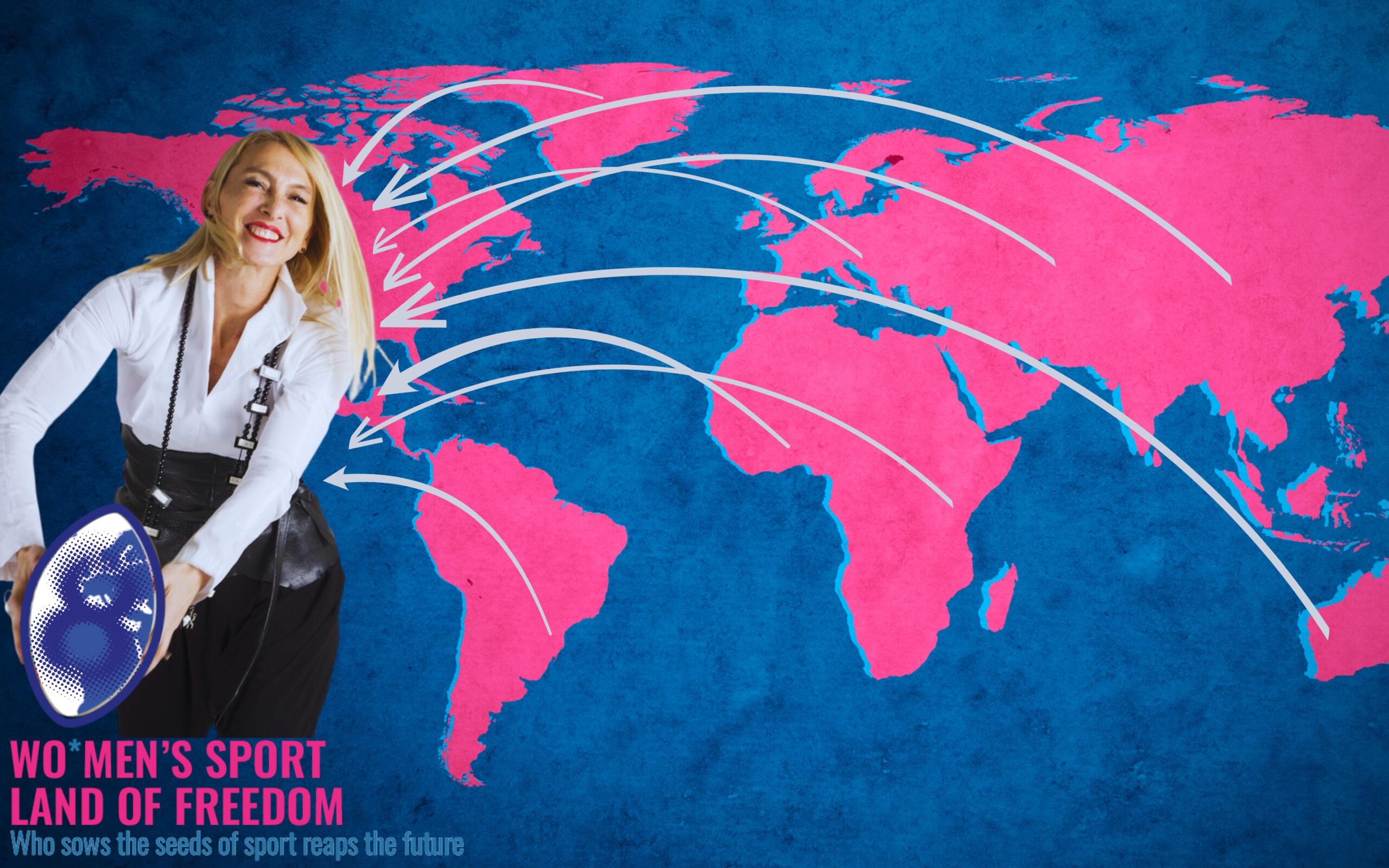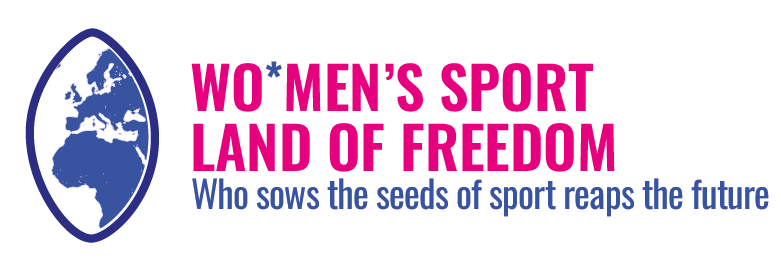
USA: RUGBY TEACHES YOU RESILIENCE: WHEN YOU GET KNOCKED DOWN, SOMEONE HELPS YOU BACK UP
“Rugby teaches you resilience: when you get knocked down, someone helps you back up”

Thanks to:
Karrissa Heffernan
Director of the US Women’s Rugby History Project
John Nauright
University Professor, Pedagosist
- The history of the women’s movement in USA
- Testimonials
- Reading Time: 7 minutes
USA - Find out more
The United States is a federal republic and presidential democracy in North America, with a population of about 334 million in 2025, split almost evenly between men and women. At the federal level, women hold about 28% of seats in Congress (26% in the Senate, 28.7% in the House of Representatives). In executive leadership, only 12 governors (24%) are women. In the labor force, women’s participation stands at 57.1% (July 2025), while the core working-age group (women aged 25–54) reaches 77.7%. However, in 2025 many women—especially those with young children—are leaving the workforce: between January and June, more than 212,000 women dropped out, reversing recent trends. (Source: FRED – Labor Force Participation Rate Women; FRED – LFP Women 25–54; Center for American Women and Politics; Wikipedia – Women in U.S. Congress; TIME via BLS; Washington Post)
HISTORY OF THE COUNTRY (Karrissa Heffernan)
1. When did the women’s rugby movement start in your country and what is its history? How is rugby structured in your country?
On a gray and rainy autumn day in 1972, the first women’s rugby match in the United States was played, between the women’s teams of the University of Colorado at Boulder and Colorado State University. By the end of 1973 there were six women’s teams in the U.S.; by 1980 that number had grown to 212, mostly university teams. Women’s rugby continued to grow over the decades, reaching over 1,200 women’s teams across youth, high school, collegiate, club, and professional levels. The U.S. Women’s National Team played its first official international match against Canada in 1987. The team remained unbeaten until 1991, winning the inaugural Women’s Rugby World Cup that same year. The Americans took silver in 1994 and have competed in every subsequent World Cup. Kathy Flores coached the national team from 2003 to 2010; she was both the first woman and the first woman of color to coach a national side. In 2024 the U.S. women won bronze at the Olympic Games, led by Emilie Bydwell, the first woman to coach an Olympic rugby squad. In 2025 the first professional women’s league, the Women’s Elite Rugby (WER), was launched. There are now over 1,200 women’s and youth teams in the U.S. USA Rugby is the governing body for all rugby in the country. Club rugby is regulated by local and regional unions, which in turn report to USA Rugby. Women’s collegiate rugby is divided under three organizations: the National Intercollegiate Rugby Association (NIRA), National Collegiate Rugby (NCR), and the Collegiate Rugby Association (CCRA). Youth and high school rugby falls under USA Rugby and state-level governing bodies.
2. Do you think playing rugby has a social impact for women in your country?
Yes. Women’s rugby in the U.S. was born out of the feminist movement of the 1960s and Title IX, an educational law guaranteeing equity in federally funded school programs, including sports. Rugby has long been seen as a “countercultural” sport for women in the United States. The acceptance of different body types, races, ethnicities, and gender identities is still today a point of pride for the women’s rugby community.
3. In your opinion, what can rugby offer to women in your country?
Women’s rugby in the U.S. continues to value difference and claim equity. Over the decades, women’s leadership in rugby has fought to be included in decision-making processes at all levels and to ensure a better future for the sport. The motto “leave the jersey in better condition than you found it” guides U.S. women’s rugby at every level.
LISTEN TO THE FULL INTERVIEW HERE: https://www.youtube.com/watch?v=FSnBAd2Zdlk&t=14s
JOURNEYS THROUGH RUGBY (Kerri Heffernan excerpt from a video interview)
1. What has rugby taught you that has had an impact on your daily life? Can you give me an example of when a rugby mindset was useful?
Rugby has had a powerful impact on my self-esteem and self-awareness: “It helped me discover what I was capable of and gave me confidence in myself. (…) Rugby was liberating. (…) The whole approach to life, to feminist activism in sport, and to forming the first national team is a practical example of a rugby mindset: collective building, resilience, vision.”
2. Can you give me three words that connect rugby with freedom?
- Self-determination: “Rugby was liberating because no one wanted me to play it.”
- Awareness: “It helped me discover what I was capable of…”
- Courage: “This game can change the way women perceive themselves.”
3. Which object represents you and why? What is a quote that guides your life?
This photo of me and Kathy is the object I chose. (…) “The trophies are in the attic, but what I cherish most are the photographs. (…) The emotional and symbolic bond with Kathy Flores is very strong.”
“Fate whispers to the warrior, ‘You cannot withstand the storm.’ The warrior replies: ‘I am the storm.’”
JOURNEYS THROUGH RUGBY (John Nauright excerpt from a video interview)
1. How did you discover rugby’s existence?
I started writing about rugby while working on my PhD, focusing on anti-apartheid protests and rugby in South Africa. Later I got my first academic post at the University of Otago in New Zealand. Rugby came into my life through study and research. Rugby is everywhere. It completely absorbs you. I began writing about rugby, masculinity, and how rugby promoted masculine values across the British Empire.
2. What has rugby taught you that has had an impact on your daily life? Can you give me an example of when a rugby mindset was useful?
Rugby is more than just masculinity: it is about teamwork, trust in your body and your teammates. That makes rugby unique and more interesting than many other sports. Rugby teaches you resilience: when you get knocked down, someone helps you back up. You have to stay positive within yourself to keep going. When I co-edited a four-volume encyclopedia on sport around the world, it took years of teamwork, leadership, and resilience — just like building a rugby team.
3. Can you give me three words that connect rugby with freedom?
Individuality, Structure, Team. Freedom in rugby means the ability to express your individuality while being part of a team. You express yourself, but always within a structure that depends on your teammates.
4. What is a quote that guides your life?
A favorite line from the poem Invictus: “I am the master of my fate, I am the captain of my soul.”
